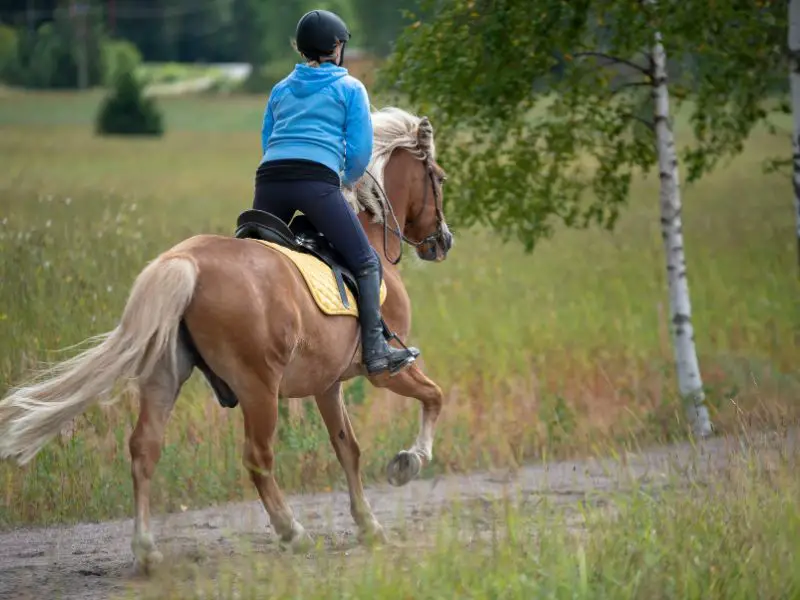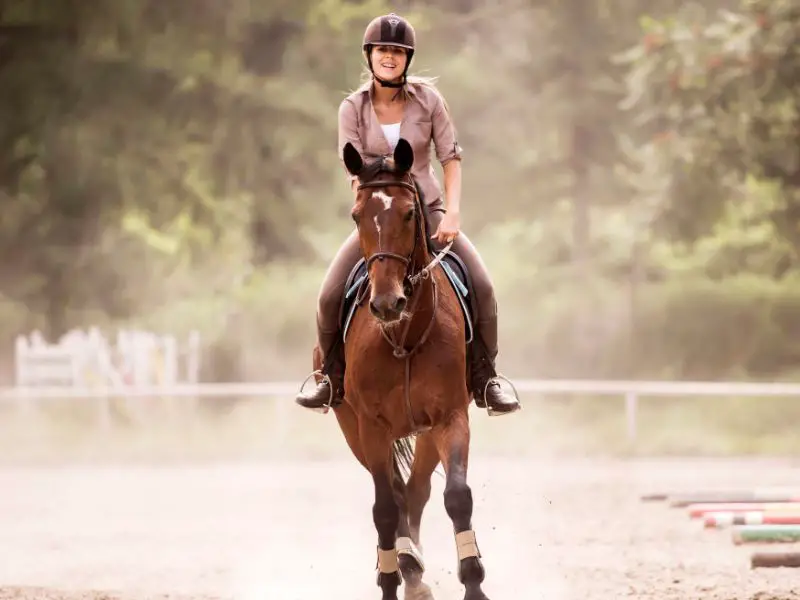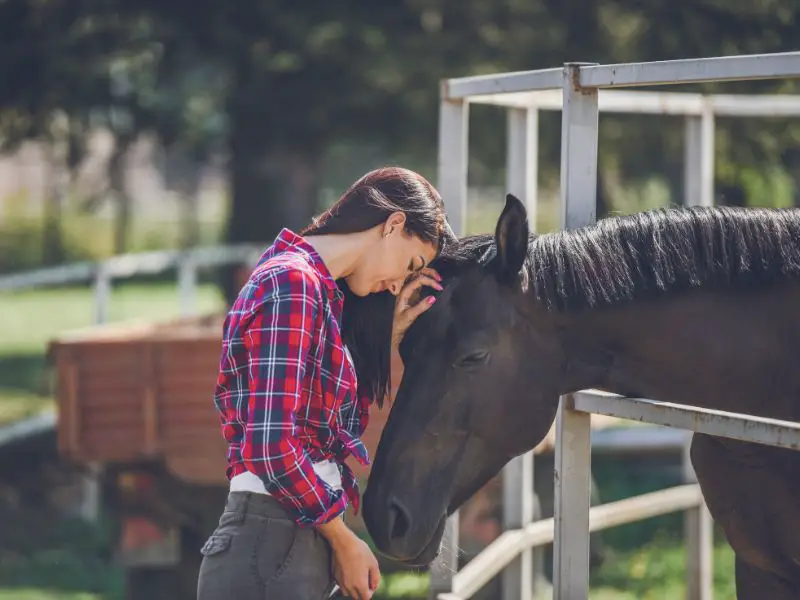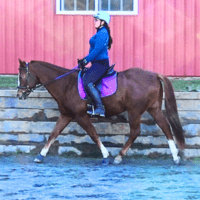As soon as I found out I was pregnant my husband wanted me to stop riding. I was torn because horses have been such a big part of my life. Aside from God, horses have always given me a sense of comfort, purpose, and drive.
Whether or not to continue riding during pregnancy is a very personal decision that depends on your individual comfort level and circumstances. Consulting with healthcare professionals, especially your obstetrician, is crucial to make an informed decision based on your health profile and any risk factors.
I have been riding with hardly any breaks since I was a young girl. From lessons to working student positions to being on a college dressage team to being a resident student and working on a huge eventing farm to training green horses and ottbs, to become a riding instructor.
So the prospect of stopping riding for 9 months and probably more really bothered me.
I decided to do some research on riding while being pregnant. To find out if it is possibly safe to do so. What I realized and found out was that there are risks associated with riding while pregnant and you should stop after a certain point, but there are also some benefits to riding while pregnant.
I did decide to stop riding until after my pregnancy. But I had been riding for the first two months or more because I didn’t know I was pregnant.

Benefits Of Horse Riding While Pregnant
Medical Advice: Be sure to consult specifically with an obstetrician for medical advice about whether horse riding is safe during your pregnancy. They will be able to provide guidance based on your health history and any risk factors.
It made me really happy to find out that there are benefits of horse riding while pregnant, despite only riding the first two months of my pregnancy.
Horse riding while pregnant like other forms of exercise helps with a reduction in fluid build-up and varicose veins. Exercise helps build and maintain the stamina needed for labor and delivery.
Exercise Benefits During Pregnancy: Exercise during pregnancy provides numerous benefits for both mom and baby. Regular physical activity can help reduce stress and anxiety, improve sleep, boost energy levels, and prevent excessive weight gain. Exercise helps maintain strength and stamina needed for labor and delivery. Staying active can also lead to fewer complications during pregnancy and faster postpartum recovery. When done safely, continuing exercise routines throughout pregnancy is widely recommended by healthcare professionals.
Riding horses is especially beneficial for strengthening kegel or pelvic floor muscles. Check out this article by Pampers about the benefits of strengthening your kegels and pelvic floor muscles.
With so many changes you need to make during pregnancy, sticking with horse riding can help keep a sense of your identity. Not only that but riding can help with your mental health, reducing stress and anxiety, depression. Doing something you love like riding can help you sleep better at night because you are less stressed.
A less stressed out mama with lower cortisol levels (a stress hormone) will help your baby’s wellness also.
… this study showed that late pregnancy anxiety and cortisol was associated with children’s respiratory and digestive illnesses till the age of 3.0–3.5 years. Additionally, more daily hassles were related to more prescribed antibiotics between one and six years.
Taylor and Francis Report- Original Research Report- Maternal late pregnancy anxiety and stress is associated with children’s health: a longitudinal study

Can You Horse Ride In Early Pregnancy?
I rode in my early pregnancy and my baby is well developed, and healthy. Granted I didn’t know I was pregnant when I was still riding.
If you know you are pregnant check with your doctor first to get their opinion. Every pregnancy is different, sometimes you may need bed rest and sometimes they recommend exercising.
Minimizing Risks: For activities like horseback riding that carry inherent risks, take precautions to minimize dangers. Ride in controlled environments under supervision, use proper safety gear, stick to steady and well-trained horses, avoid jumping or speed work, and ride with an experienced companion. Know emergency procedures and have phone access in case of a fall.
First Trimester Risks
Risks are lower in the first trimester, but falling poses a threat of miscarriage or placental abruption. Ride cautiously and inform your doctor.
First 12 Weeks
During the first trimester, the uterus remains within the pelvis, which may provide some protection from blunt trauma in the event of a fall. For this reason, some women choose to continue riding in early pregnancy up to 12 weeks. However, risks like placental abruption from intense bouncing while riding may still pose concerns.
Listen to Your Body
Pay close attention to any concerning symptoms and immediately stop riding if you notice anything unusual. Stay in tune with your body.
Risks & Safety: Around 12 weeks, the risks increase as the fetus moves up above the pelvic girdle, leaving it more exposed. The safety of both mother and baby should be the top priority when deciding whether to continue riding while pregnant.
Early in pregnancy; the first trimester, your baby is in your pelvic girdle, which is low in your belly and would provide some level of protection if you were to fall. As your baby gets bigger and moves up higher in your abdominal wall the risks increase immensely if you were to fall.
Second Trimester Changes
As your belly grows, balance shifts and risks increase. The uterus expands above the pelvis, leaving the baby less protected. Seriously consider stopping riding.
Hormonal Changes: Pregnancy brings major hormonal changes that can affect the body and impact riding skills. Relaxin hormone loosens ligaments and joints, which can cause balance issues and joint instability. This joint laxity, combined with a shifting center of gravity, can potentially increase falling risks. Be mindful of these changes and adjust riding accordingly.
Third Trimester Cautions
In the third trimester, falling poses great risk of injury. Balance and comfort are significantly impacted. Stop riding unless your doctor explicitly approves.
Should You Ride Horses When You Are Pregnant?
Doctors recommend avoiding activities where there is a high risk of abdominal injuries or falling. Even though riding during the first trimester will probably be fine, you have to keep in mind you are still taking a risk.
Those with pre-existing conditions or a history of pregnancy complications should seek guidance from an obstetrician before riding while pregnant. Certain medications, illnesses, or prior issues may warrant stopping riding immediately. Specialist input is crucial for high-risk pregnancies.
Questions to Ask Your Obstetrician
- Is it safe for me to ride horses during my pregnancy?
- Until what point is it advisable to ride?
- What signs or symptoms should I watch out for?
- How often should I check in with you throughout my pregnancy?
- What safety precautions do you recommend I take?
Some experienced riders do continue riding during the early stages of pregnancy, taking precautions like sticking to steady, reliable horses and avoiding fast work or jumping. For professional riders who rely on riding for their income, stopping may present more of a dilemma.
Competitive riders who want to continue showing during pregnancy must get explicit medical clearance. Most associations prohibit sanctioned events after a certain point in pregnancy – usually 5-6 months. Adhere to any competition restrictions and always listen to your doctor’s advice.
The risks and benefits of riding while pregnant can vary greatly depending on your skill level and experience. Beginner and novice riders will likely face higher risks than expert riders who have many years of experience controlling a horse in various situations. An experienced rider may feel more comfortable continuing into the pregnancy than a beginner still developing skills and balance. Gauge your skill honestly when deciding if you should ride.
Aside from falling off, getting bumped in the stomach by the horse’s head, your horse tripping or getting kicked, there is also the problem of the placenta detaching from the uterus from all the bouncing and movement in the saddle.
Then further along in your pregnancy as your baby grows, your balance will be affected as well as your comfort. As you know your balance affects your horse’s balance and movement. So keep this in mind if you are thinking of continuing to ride.
If you still desire to ride during your pregnancy, make sure you take it easy, on a calm reliable horse that has smooth gaits. Fast work and jumping definitely not recommended.
Safety Gear is a Must: ALWAYS wear a properly fitted helmet and protective vest designed for riding if you choose to ride while pregnant. Protect yourself and the baby.
Weather and Seasonal Impacts: Weather conditions affect your comfort and safety while riding during pregnancy. Hot, humid days can increase discomfort and dehydration risks. Icy, wet ground ups the chances of slipping and falling. Consider the weather impacts of your riding environment.
If you want peace of mind and less risk and decide not to ride. That is okay. You don’t have to totally miss out on horses during that time. You can spend your would-be riding time learning by watching other riding lessons. If you have your own horse you can work on strengthening your bond and communication with your horse.
Safe Horse-Related Activities During Pregnancy
- Grooming and handling your horse from the ground
- Lunging or round pen work with your horse
- Watching lessons and coaching others
- Studying horsemanship
I did still work at the barn doing the feeding, turn out, mucking stalls and all the normal chores until I was 10 months pregnant. I think it actually helped me when it came time to labor and delivery because it kept me in shape and I still got some sort of horse fix.

When Should I Stop Riding When I Am Pregnant?
You should stop riding if your doctor thinks it’s unsafe for you or your baby.
Promptly inform your healthcare provider about any riding accidents, even minor falls with no evident injury. Some complications like placental abruption may not manifest immediately so monitoring after falls is essential. Do not ignore or downplay seemingly insignificant spills.
Having thorough consultations with healthcare providers allows you to make the most informed decision based on your personal health profile. There is no one-size-fits-all approach, so take the time for an open discussion.
Stop riding and seek medical guidance if you experience concerning symptoms like bleeding, cramping, decreased fetal movement, contractions, blurry vision, faintness, dizziness, or pain. Do not try to push through discomfort as it could indicate underlying problems requiring evaluation.
You should stop riding if your balance is being affected, as you could be more at risk of falling off or bouncing around and detaching the placenta.
There is much less protection for your baby after the first trimester. So you should really consider stopping riding towards the end of the first trimester.
Stop if your horse is not calm or reliable enough to be trusted for you and your baby to be safe. Of course, to some extent, no horse can be 100% reliable.
Selecting a Suitable Horse: If you do choose to ride while pregnant, be very selective in choosing an appropriate horse. Opt for horses that are calm, steady, and responsive to aids. Avoid horses that are spooky, unpredictable, or have choppy gaits. Match the horse to your skill level.
When you do stop riding, as long as your doctor gives you the go-ahead, keep exercising. Staying in shape and flexible during your pregnancy will give you the strength and stamina for the labor and delivery, it will help you recover faster and you will be back on a horse quicker.
Other Beneficial Exercises
- Swimming
- Prenatal yoga
- Walking
These low-impact activities can provide exercise benefits during pregnancy without the risks of riding.
Workout Video For Pregnant Mamas To Get Back In Saddle
Here’s a video I found on YouTube similar to what I followed and found helpful during my pregnancy. So you can get in shape for baby delivery, recover faster postpartum and get back in the saddle faster.
Getting Back in the Saddle
After giving birth, consult your doctor about when it is safe to resume riding. Ease back into it gradually, starting on steady horses and avoiding fast work until you rebuild strength and balance. Listen to your body.
Recovery Time and Returning to Riding
Recovery time varies, but plan for at least 2-3 months after giving birth before riding again. Clear it with your doctor and take it slow.
Can Riding A Horse Cause A Miscarriage?
Riding horses during pregnancy is something you definitely want to consider with caution.
While an uncomfortable topic, miscarriage risks are real with horse riding. Be sure to honestly weigh your concerns.
Every woman’s experience with riding during pregnancy can be different. Some may feel confident to continue into the second trimester, while others may stop immediately upon learning they are pregnant, especially if they have a history of miscarriage. Sharing diverse anecdotes and studies can illustrate the range of perspectives.
High-profile riders like Zara Phillips and Georgina Bloomberg have continued riding into their pregnancies, sparking debates about the practice. These cases provide interesting examples for examining the issue.
If you have a history of miscarriage its best that you wait to ride after the baby is born. It’s not worth the risk.
If you fall, get kicked, or the placenta detaches the risk for miscarriage is very high.
Will You Horseback Ride During Your Pregnancy?
Ultimately it is up to you and your doctors if you want to ride during your pregnancy. There are some benefits to doing so. But you gotta weigh the risks versus the benefits and if you want to take on that responsibility. And if you do decide to ride it’s best you stop before the end of the first trimester. Remember there are other horsey things you can do besides riding during your pregnancy.
Check out Savvy Horsewoman’s 10 Tips For Horseback Riding During Pregnancy.
Personally, I chose to forgo riding during my pregnancy, after I found out I was pregnant because I didn’t want to take any risks. I felt like I couldn’t forgive myself if something did happen and I would be worrying about all the what if’s.
The next time, however, If I am still leasing Chip I may ride him in my first trimester. He is a steady eddy, very smooth and I feel comfortable enough to do some easy-going walk-trot on him. If there was any day I felt doubt though I wouldn’t ride and probably just hang out with him or hand walk him.
In the end, the journey of pregnancy is special, and it’s essential to listen to your body and consult healthcare providers. Weigh the risks and rewards of activities like horse riding, and make the personalized choice that feels right for you. Don’t feel pressured, but focus on the joy of bringing new life into the world.
Did you find this post helpful? If so, could you help me by sharing this post? Thanks!
Let me know in the comments if you rode during your pregnancy or if you are planning to ride during your pregnancy or not.
Cheers, Kacey

